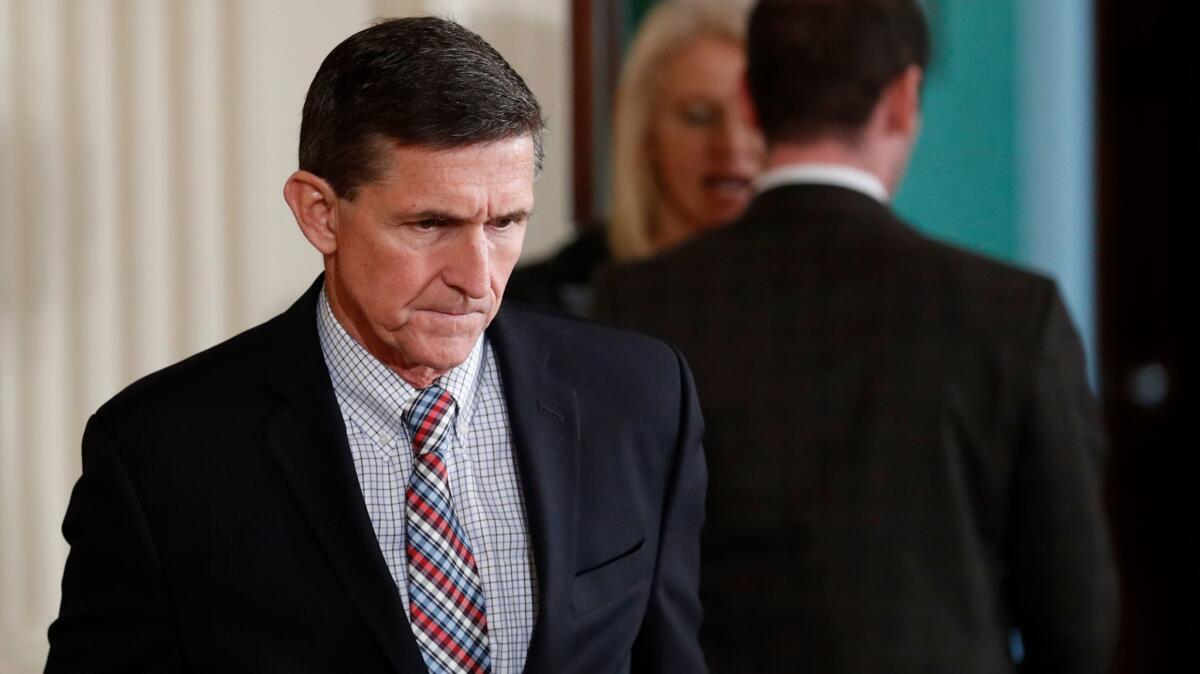Op-Ed: If he did nothing wrong, why did Michael Flynn lie?

- Share via
President Trump tweeted Saturday that he “had to fire General Flynn because he lied to the Vice President and the FBI,” adding, “it is a shame because his actions during the transition were lawful. There was nothing to hide!”
Both halves of the tweet are jaw-dropping.
In the first half, Trump admits to knowing that Flynn, his onetime national security advisor, had already lied to the FBI at the time he pushed FBI Director James Comey to drop the investigation into Flynn. (The overture to Comey came the day after Trump fired Flynn.) Pushing your Justice Department to stifle an investigation of a known felon sounds a lot like obstruction of justice.
The second half of the tweet — the assertion that it was perfectly fine for Flynn to make contact with Russian government actors before Trump was actually president — is equally disturbing.
Trump defenders have advanced a two-part argument to justify pre-inauguration conversations with Russia. Their first, a legal claim, concerns the Logan Act, which makes it a crime for unauthorized citizens to negotiate with foreign governments that have a dispute with the United States. Trump defenders note, accurately, that its broad sweep has left it in a legal no-man’s-land. The Logan Act has almost never been used. The special counsel in charge of the Russia probe, Robert Mueller, would find it difficult to dust it off for this situation.
Trump defenders’ second refrain is that it is routine for incoming administrations to reach out to other countries — as a way to lay the groundwork for their ascent to power.
If that’s the case, then why did Flynn lie? The apologists have not advanced any sensible response to that question.
I think Flynn lied because he understood, correctly, that he and his colleagues had done something very wrong and inimical to U.S. interests.
Flynn wasn’t a misguided private citizen (think Dennis Rodman in North Korea) flying off to consult with a foreign power. Such bumbling freelance diplomacy can be vexatious to the government, but no one could confuse it with a legitimate U.S. foreign policy initiative.
And Flynn wasn’t just reaching out to, say, introduce himself or receive basic information. He was intentionally undermining the Obama administration.
Mueller’s team has outlined that in late December 2016:
- Flynn asked the Russian ambassador, Sergey Kislyak, not to escalate tensions in response to sanctions that the United States had imposed against Russia. Kislyak agreed.
- At the behest of a very senior official who is almost certainly Trump’s son-in-law, Jared Kushner, Flynn contacted officials from foreign governments, including Russia, to see where each stood on a U.N. resolution against Israel for its settlement policy, which the United States had decided to let pass.
- Flynn asked Kislyak to delay the U.N. vote or to defeat the resolution.
What this means, unavoidably, is that the Trump transition team was carrying on a rogue foreign policy effort, on issues of the highest sensitivity to U.S. interests, with neither State Department oversight nor expertise. Flynn and others sought concessions, made assurances and negotiated deals behind the back of the Obama administration — on matters they could not have fully understood.
The questions arising from this closet operation are many and alarming.
What sorts of risks to U.S. interests and even international stability were run by the Trump transition team’s decision to arrogate to itself, and secretly, the conduct of important foreign affairs?
What kind of diplomatic or even military calamity might they have bumbled into?
What sorts of nuanced considerations involving not just Israel but also Syria, Iran, China, and others were in play in the Obama administration’s decision to let the settlement resolution pass?
What if Israel had quietly acceded to the U.S. abstention in return for aid or other covert assistance?
How did it look later to the international community that the Trump team was able to work its will on the sanctions that the Obama administration had so painstakingly put in place?
Nuanced and multidimensional moves are the norm in foreign policy, and Team Trump was playing blind.
But if their conduct wasn’t routine, some might argue, it wasn’t exactly novel. It’s widely assumed, for example, that the incoming Reagan administration interfered in hostage-crisis negotiations with Iran.
That analogy, however, cuts in the other direction. Reagan officials staunchly denied the charges, with a vehemence that revealed their understanding of how outrageous such conduct would have been. Both houses of Congress held separate investigations into the matter, moreover, and concluded that the charges could not be substantiated.
We only have one president at a time, and for good reason. What the Trump team’s rogue foreign policy amounted to was an attack on the president as commander-in-chief and an exposure of U.S. citizens to gratuitous and incalculable risks. That’s arguably far more serious than a lie to the FBI or a personal or financial misdeed.
Only Congress can determine whether such behavior, assuming it was fully sanctioned by Trump, amounts to an impeachable high crime or misdemeanor. But the arguments in that direction are strong.
Harry Litman, a former U.S. attorney and deputy assistant attorney general, teaches at UCLA Law School and practices law at Constantine Cannon. @harrlitman
Follow the Opinion section on Twitter @latimesopinion or Facebook
More to Read
A cure for the common opinion
Get thought-provoking perspectives with our weekly newsletter.
You may occasionally receive promotional content from the Los Angeles Times.










